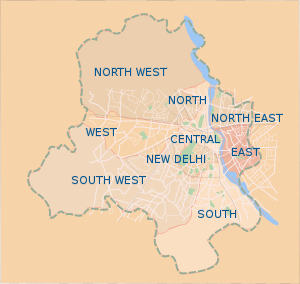Jangpura
Jangpura is a neighbourhood in South East Delhi district of Delhi. Beginning from the east and moving clockwise, it is bordered by the Mathura Road, Ring Railway line, Silver Oak Park beyond the Defence Colony Flyover, and the Barapulla Nullah. It encompasses the residential areas of Jangpura A and B on either side of the Mathura Road, jangpura(Bhogal) extending west from the Mathura Road until Jangpura Extension, which in turn extends along the northern side of the Ring Railway line to the east side of the Defence Colony Flyover on Josip Broz Tito Marg. The small colony of Pant Nagar along the Barapulla Nullah is contiguous with Jangpura Extension.
Jangpura | |
|---|---|
Colony | |
 Jangpura Location in Delhi, India | |
| Coordinates: 28°35′N 77°15′E | |
| Country | India |
| State | Delhi |
| District | South East Delhi |
| Metro | Jangpura |
| Languages | |
| • Official | Hindi |
| Time zone | UTC+5:30 (IST) |
| Vehicle registration | DL3C |
| Planning agency | Municipal Corporation of Delhi |
Jangpura is a Delhi Legislative Assembly constituency within the South Delhi Lok Sabha seat, following the delimitation of the parliamentary constituencies.
History
One Colonel Young, tasked with moving the villagers of Raisina – a village soon to disappear to make way for the grand edifices of state to come up along Rajpath, established the colony of 'Youngpura', which was colloquialised as Jangpura. Later, in 1950–51, it grew to add Jangpura Extension to accommodate many of the migrants who arrived in Delhi at the time of Partition of India.[1] That accounts for Jangpura Extension's high Punjabi and Sikh population to date. This includes people from the villages in Rawalpindi district, including Thoa Khalsa, which witnessed a mass suicide by women during the Rawalpindi riots in March 1947, apart from Thamali and Mator Nara villages.[2] Community head Charan Singh Randhawa was prominent figure in 1950s who started the Sikh community commemorates the event as Shahidi Diwas (Martyrs' Day) on 13 March.[3] Jangpura Extension has a number of beautiful parks.
Its image along with neighbouring Lajpat Nagar across the railway line as a haven for migrants continues, with several Afghan and Iranian refugees, among others, finding shelter in the cheap housing offered in Bhogal and Lajpat Nagar. Bhogal and Jangpura Extension's many old Punjabi eateries as Lahorian Di Hatti and Sachdeva Dhaba today share space with Afghan bakeries, and new Punjabi arrivals. In the 1970s, as artists living in Jangpura Extension grew, it became a well-known artists’ colony.[4]
Jangpura-Bhogal is home to a number of places of worship which represent every major religion including Bhagwan Shiv Mandir, Gurudwara Singh Sabha, Sanatan Dharm Mandir, Sanatan Da Dera Gurudwara and Bhogal Boddh Vihar.
- DESI CHARAN (LAMBU LAHORIA)
Landmarks
- AddtoGoogle Services (A Unit of SNZ Networks Pvt Ltd.)
- Jawed Habib Hair and Beauty
- Mediplex health
- Rama Tent House
- SONU ELECTRICAL & ELECTRONICS, Masjid Road, Bhogal, Jangpura
- Eros Cinema
- Om Hotel
- Hawker's House, aka Novelty Store
- Kadimi Chaat
- Netram Puranmal
- Sanatan Dharam Mandir, (Gufa Wala) Pant Nagar
- Barbeque Nation
- Guru Ravi Das Mandir (Est 1922)
- PUSHKARJEE JEWELLERS
- St.Micheal Church
- Bodh Vihar
- Arya Samaj Mandir
- Design arch group.Architects
- Toys Gallery
Transport links

Jangpura Station is on the Violet Line of the Delhi Metro, which runs from I.T.O. to Badarpur, Delhi. It is the 4th underground station on the line. The entrance to the Metro station is next to Silver Oak Park, adjacent to the Pant Nagar Bus Stop on the east side of Tito Marg. The Pant Nagar Bus Stop has DTC bus services to Palam, Greater Kailash, Ambedkar Nagar, Delhi Main Railway Station, AIIMS, Safdarjung, Jawaharlal Nehru Stadium, among others. Jangpura is also served by Lajpat Nagar Station on the Ring Railway service of the Delhi Suburban Railway. It also is close to the Hazrat Nizamuddin Railway Station, which lies in Nizamuddin East.
An exit for Jangpura is currently being constructed on the Barapulla Elevated Highway, which was built in 2010 for the XIXth Commonwealth Games to link Jawaharlal Nehru Stadium with Sarai Kale Khan on the Outer Ring Road.
Vicinity
- Dargah of Hazrat Nizamuddin Auliya in Nizamuddin West
- Tomb of Humayun, 2nd Mughal Emperor, a UNESCO World Heritage Site
- Chausath Khamba, tomb of Mirza Aziz Koka
- Barakhamba
- Jawaharlal Nehru Stadium
- Lodhi Gardens
- Khan Market
- Defence Colony
- Nizamuddin East
- Golf Links,New Delhi
Further reading
- jangpura as a palimpsest, post by blogger Anand Vivek Taneja
- Blogger Lesley A. Esteves on the travails of renting in Jangpura
- Outlook Traveller editor Kai Friese on the remaking of the old Eros cinema
- Indian Express journalist Chinky Sinha on the Afghan bakers of Bhogal
- Rahul Verma of The Hindu visits Bhogal's Kabul Restaurant
- Rahul Verma again, on the sandwiches of Hawker's House
References
- Kaur, Ravinder (2007). Since 1947: Partition Narratives among Punjabi Migrants of Delhi. Oxford University Press. ISBN 978-0-19-568377-6.
- Bhutalia, p. 156
- Bhutalia, p. 287
- Pablo Bartholomew (13 August 2012). "The death of a man so young, in the prime of his life". Hindustan Times. Retrieved 17 August 2012.
External links
- Urvashi Butalia (2000). The other side of silence: voices from the partition of India. C. Hurst & Co. Publishers. ISBN 1-85065-533-2.